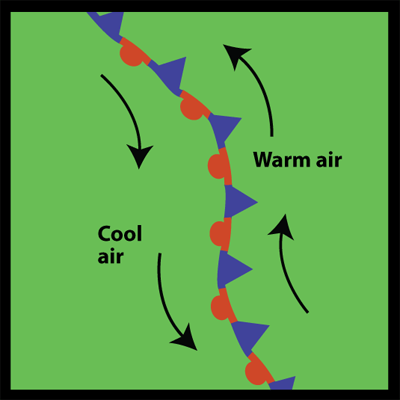The type of cloud that is associated with periods of long, steady heavy rain or snow.
What are nimbostratus clouds?
The relative humidity of air at 40 degrees C that contains 45 g/m3 of water vapor.
What is 90%?
The type of front that stalls or does not move for hours or days.
What is a stationary front?
Draw the symbol on a weather map for a cold front.

A comparison of the amount of water vapor in the air to the amount of water vapor needed for saturation.
What is Relative Humidity?
The characteristics of air located at high pressure.
What is dry, descending, cool, dense air?
The relative humidity of air at 25 degrees C that contains 7 g/m3 of water vapor.
What is 32%?
The type of air mass that would be considered warm and moist.
What is a mT airmass?
Draw the symbol for a stationary front.

Describe how clouds form.
What is from warm, rising air that cools as it rises and allows water to condense into clouds?
Type of precipitation that occurs when snow falls through a small warm layer and freezes before reaching the surface.
What is sleet?
Air at 15 degrees C has a RH of 100%. If the temperature rises to 20 degrees C Is the dew point reached?
What is NO the dew point will not be reached if the air temperature rises because warm air can hold more water vapor than cold air?
Describe TWO factors that would help you identify a cold front?
What are cold air advancing, steep slope of front, cumulonimbus clouds, and thunderstorms?
The type of weather associated with high pressure.
What is fair weather?
Describe how an air mass gets its properties.
The rotation of air around a low pressure system moves in this way in the northern hemisphere.
What is inward (towards the low) and counterclockwise?
Air at 35 degrees C has a RH of 30%. If the temperature drops to 20 degrees C. Is the dew point reached?
What is No, dew point is not reached (11.1 < 15).
The type of air mass that would contain the least amount of water vapor and explain why.
What is a cP air mass because continental air is dry and polar air is cold so it can hold less moisture?
A city that is ahead of a cold front experiences warmer temperature and cloudy skies. This is what happens at that city as the front passes through.
What is as the front approaches it begins to rain and as the front passes the temperature drops, the rain begins to stop, and skies will begin to clear?
A wind vane that is pointing to the north northeast indicates a wind coming from this direction.
What is the north northeast?
Describe the type of air that would allow the most water vapor to evaporate into it.
What is the air is DRY and WARM? (*Wind will help speed up the evaporation!*)
Air at 25 degrees C has a RH of 70%. If the temperature drops to 20 degrees C. Is the dew point reached? What is the new Relative Humidity?
What is Yes, dew point is reached (15.4 > 15). The new relative humidity is 100%.
Describe TWO factors that would help you identify a diagram of an occluded front.
What are warm air cut off from the surface, cold air advancing towards cool air, clouds forming where the warm air is aloft?
The current type of weather associated with a city ahead of a warm front.
What is cool temperatures and long periods of steady rain or snow?
When condensation, such as dew, forms the water comes from here.
What is the water comes from the air?